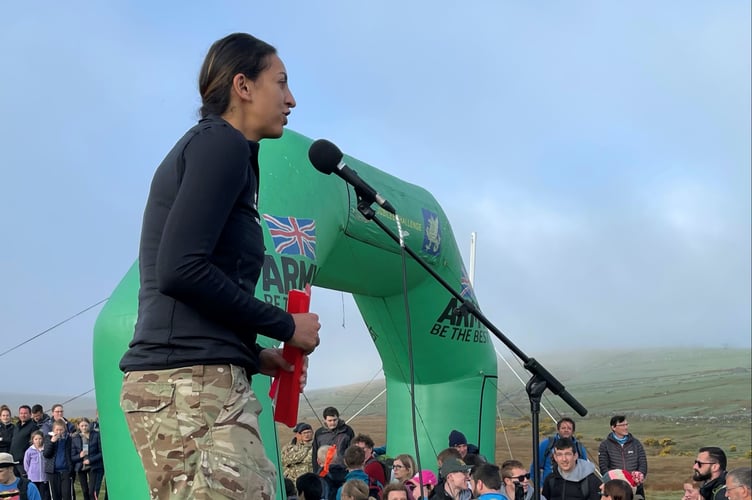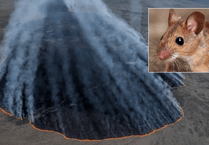ALMOST 2,500 teenagers from across the South West gathered on Dartmoor last weekend to take part in the 60th Ten Tors, the nation’s largest expeditionary challenge.
Starting on Saturday morning, 2,491 teenagers including Okehampton and Tavistock youngsters, set off from Okehampton Camp to spend the weekend on the moor to complete a 35, 45 or 55-mile trek unaided.
This was the first Ten Tors challenge held in two years since the pandemic forced organisers to cancel the event.
Director of Ten Tors, Colonel Gary McDade said: ‘What a fantastic challenge, over two and a half thousand young people have been out on the Moor blessed with good weather, undoubtedly the Ten Tors flame is very much alive.’
Participants had to rely on teamwork and navigational skills, and sheer grit and determination to succeed. The use of mobile phones or GPS was forbidden and no adult intervention was allowed but safety was at the heart of the event and each team was equipped with a special tracker which was monitored in a military operations room manned 24 hours by service personnel and civilian staff. They could also alert the organisers if an emergency arose.
Excited participants gathered at Okehampton Camp on Friday, setting up camps and planning walking routes for the following two days.
Erin, a Dartmoor Plodders team member, said: ‘What I’m looking forward to is just doing it as a team and the sense of achievement when we get back.’ Her team mate, Holly, added that they were eager to get out because they had been training for the event for so long.

After the start of the main event, 300 youngsters with special physical or educational needs started the Jubilee Challenge. The teenagers -— many in wheelchairs — entered either as teams or as individuals and completed routes of up to 15 miles; they were each accompanied by an officer cadet from Exeter University Officer Training Corps.
This year saw a new aspect of this very special event with the trial of the Jubilee Plus Challenge, where a handful youngsters camped out overnight instead of completing their hike on the same day. Its success will be reviewed and could be introduced next year.
In acknowledgement of the 60th anniversary, Gryphon School from Sherborne in Dorset completed the challenge wearing clothing like that worn by the pioneers of the event in the early sixties.
Edward Smith, one of the students involved, said: ‘We wanted to dress like this for the 60th anniversary. Having done a few walks with it on we wanted to see if we could make it all the way around Dartmoor with this stuff on.’
Captain Preet Chandi, who started the event, recently completed a solo expedition across Antarctica to the South Pole, in her speech to the challengers she said: ‘Ten Tors is fantastic; it was so great to see all those young people raring to go at the start line. I love seeing people outdoors and to see so many young people from so many different backgrounds is amazing.
‘A lot of us don’t see the work that goes on behind the scenes, there is so much preparation and training to get to this point. So, I say well done for getting here! This is a huge part of the journey, this is the last leg and yes it will be challenging but remember what you did to get here, and that is important.
‘Look after yourself, look after your team as well, work as a team!’

Although known as the ‘Ten Tors Challenge’, the event has another name and purpose as serving as the backdrop for Exercise WYVERN TOR, a high-level military resilience exercise led by the British Army’s Headquarters South West based in Tidworth, Wiltshire.
Major John Porter from the Royal Logistic Corp led one of the teams dealing with traffic control for the event and explained that the their role provided especially good training opportunities for the soldiers as the Ten Tors gave them chances to improve planning and organisational skills which can be implemented in a military setting.
‘This car park that we are manning is just one of a couple of different areas. We have got to make sure that the car park is usable. There are sixty personnel here who are all giving up their free time,’ he added. He estimated that his team would deal with over 10,000 vehicles over the two days.
Devoncourt High School For Boys, Plymouth were the first of the Ten Tors teams to cross the finish line taking ‘Bronze’ just before 8.30am on Sunday. They were greeted by whoops of delight and congratulations from the crowd as they were first past the post completing the 35-mile challenge.
Torquay Boys Grammar School took ‘Silver’ as the first finishers of the 45-mile route and Queen Elizabeth Hospital School, Bristol completed the 55 mile ‘Golden’ route in primary position.
Mike Deacon said of Okehampton College’s participation: ‘We did pretty well. We did the 35 and 45-mile routes and the 35-mile walkers came in at about two o’clock. I think they enjoyed themselves and hope to do it again next year.’
Tavistock College principal Tristan Forster said the achievements of all the three teams involved from the college was ‘outstanding’ especially as they had no role models to help prepare them due to the event not taking place for two years. Tavistock was also represented by three teams from the Tavistock and District Youth Forum
Peter Whitfield, who completed one of the first Ten Tors challenges in 1964 and then chose to walk another later in life, said: ‘ I don’t remember it being a challenge in ‘64. You are a young fit soldier — Dartmoor was our back yard so we were pretty used to the conditions.’
In September 1959 three British Army officers from the Junior Leaders Regiment, Royal Corps of Signals based near Newton Abbot were monitoring an adventure training exercise for their young trainees on Dartmoor. and, after commenting on the trainees’ enthusiasm, decided that they would open the expeditionary event to other youngsters.
In September 1960, a ‘Ten Tors Expedition’ for boys aged 16 to 18 attracted 20 ‘patrols’ of ten servicemen each and one ‘patrol’ of three civilians from Exmouth.
At the start of their journey the entrant were handed a list of ten checkpoint located across the moor which they needed to pass in order to complete the challenge. The teams were then left to plan out the best walking route though organisers had already calculated that the best choice was approximately 55 miles.
The event was repeated in May 1961 which was more suited to school participation and this time also included all-girls teams. ‘Patrol’ size was reduced to six persons and girls were allowed to sleep at a pre-prepared camp.
A total of 156 ‘patrols’ started and 83 completed the challenge.
Pick up your copy of the Okehampton Times to see more photos





Comments
This article has no comments yet. Be the first to leave a comment.